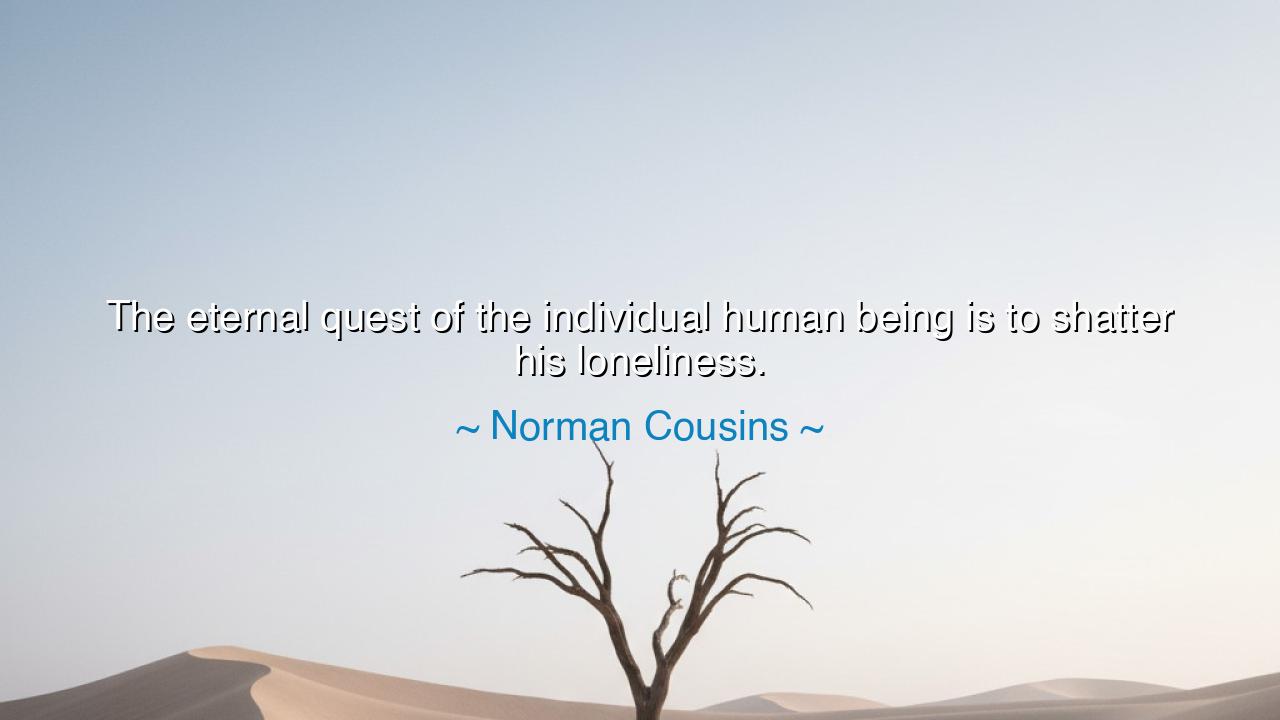
The eternal quest of the individual human being is to shatter his






“The eternal quest of the individual human being is to shatter his loneliness.”
So spoke Norman Cousins, a man who understood both the frailty and the grandeur of the human spirit. His words reach beyond time, beyond the fleeting worries of an age, to touch that ancient ache within the heart of humankind — the yearning to belong, to be seen, to be understood. This is not a passing desire but an eternal quest, carved into the very nature of existence. For though we walk among others, though cities thrum with countless souls, each heart remains a solitary flame seeking another to burn beside it.
To shatter loneliness is to break the invisible wall that separates one soul from another. It is not simply to find company, but to find communion — a meeting of spirits where masks fall away and truth stands unafraid. Loneliness is not the absence of people, but the absence of connection. Even in the midst of a crowd, a person may feel utterly unseen, if no one knows the depth of their sorrow, the quiet of their dreams, the trembling of their hope. Thus, Cousins reveals the great paradox of human life: that though we are surrounded by others, we must still labor every day to bridge the abyss that lies between heart and heart.
The origin of this truth lies deep in the dawn of humanity. From the first campfires, men and women gathered not merely for warmth, but to feel the presence of others in the darkness. Stories, songs, and rituals were born as offerings to union — sacred attempts to say, “I am here; you are not alone.” The ancient philosophers called this impulse philia, the love that binds people together in shared understanding. Even the gods, in myth, reflected this need: they descended among mortals, longing to feel the pulse of mortal hearts. For even immortality, without communion, is but a cold eternity.
Consider the story of Helen Keller, who was born blind and deaf, sealed in a prison of silence from her earliest years. Her world was loneliness without shape or sound — a vast isolation few can imagine. Yet through the tireless efforts of her teacher, Anne Sullivan, the walls of her solitude were broken. When Helen first felt the cool rush of water and the letters spelled into her hand, she awakened to connection, to language, to life. Her joy was not in the knowledge itself, but in the realization that she could finally reach another soul. In that moment, she shattered her loneliness — and from that shattering came light enough to illuminate the world.
So too must we, each in our own way, labor toward that same awakening. The path differs for every soul: some find it in love, others in art, others still in service to their fellow beings. But all must strive to bridge the distance between self and other. We must listen deeply, speak truthfully, and dare to be vulnerable, for only in vulnerability do hearts truly meet. The quest is eternal because the human heart is ever-growing — each new understanding of self brings a new loneliness to be conquered, a new connection to be forged.
This quest, though sacred, is not without peril. Many flee from loneliness by drowning themselves in noise — in possessions, distractions, or empty relationships. Yet the wise know that one must first embrace solitude before it can be transcended. Only by facing one’s own emptiness can one learn what truly fills it. To shatter loneliness is not to destroy solitude, but to transform it — to make of it a temple rather than a prison.
Therefore, let those who hear these words remember: your life’s truest purpose is not merely to exist, but to connect. Seek the souls who stir your heart toward goodness. Speak words that heal, listen with compassion, and give of yourself without fear. Every act of kindness, every honest conversation, every moment of shared laughter is a hammer striking against the walls of loneliness. And though you may not break them in a single lifetime, each strike is noble, each echo divine.
In this way, Norman Cousins’ teaching becomes a beacon for all generations: to live fully is to seek connection relentlessly. For in the end, it is not wealth or power that redeems us, but the fragile, luminous thread that binds one soul to another — a thread woven by love, strengthened by understanding, and sanctified by the eternal quest to shatter loneliness.






AAdministratorAdministrator
Welcome, honored guests. Please leave a comment, we will respond soon